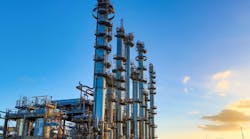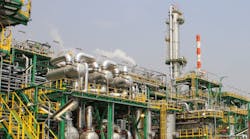The government of South Sudan, faced with alleged obstructions by Sudan, announced plans to build a refinery and pipeline aimed at transporting recently discovered crude oil to an export terminal in Kenya.
“We had to look for alternative route for exporting the oil after we have reached a deadlock with Sudan, which is exaggerating in the oil transit fees,” said Barnaba Benjamin, South Sudan's information minister.
“We have started practical steps to rapidly construct a pipeline through eastern Africa, namely via Kenya and Uganda. We expect the pipeline to be completed in 10 months,” said Benjamin, who added that South Sudan also will begin the construction of a refinery “immediately.”
Benjamin told Chinese state media that the international oil companies currently operating and producing oil in South Sudan are the ones that would construct the pipeline and the refinery.
“We do not have any problem with the companies currently operating in the south," said Benjamin, a reference to China National Petroleum Corp., Malaysia’s Petronas, and India’s ONGC Videsh Ltd.
South Sudan took control of about three quarters of Sudan’s output of 490,000 b/d when it gained independence in July. However, Sudan controls the pipeline and export terminal through which South Sudan’s oil must pass.
Benjamin said the need for a pipeline was underlined on Jan. 22 when South Sudan started to shut in oil production after accusing Sudan of confiscating its crude and demanding a transportation fee of $32/bbl. South Sudan is offering a fee of $1/bbl.
Benjamin said that negotiations between the two countries in neighboring Ethiopia have been extended until an agreement is reached on how much South Sudan will pay to transport its oil through Sudan to the export terminal at Port Sudan on the Red Sea.
Benjamin said Kenya and South Sudan have been discussing plans for a pipeline over the past few years and have identified possible investors, including Toyota East Africa. Benjamin did not give a start date for construction, apart from saying “as soon as possible.”
In December, Kenya’s Prime Minister Raila Odinga said construction of the 1.4 trillion Kenya shillings ($16 billion) transport system that aims to link Lamu port to oil-rich South Sudan and Ethiopia will start this year.
In September, Kenya’s President Mwai Kibaki said the Lamu port development is the first segment in the country's second regional and international transport system.
Kibaki said the project will eventually connect Kenya's northern Indian Ocean coast to the West Africa coastline at Douala Port in Cameroon. He confirmed that the project has attracted investors from China and Japan.
In 2010, Toyota Tsusho, a trading arm of the Japanese carmaker, outlined preliminary plans to lay a 1,400-km, 450,000 b/d oil line from Juba in southern Sudan to Lamu, an island off Kenya's coast, where the new port is to be completed in 2016.
At the time, Takashi Hattori, executive officer at Toyota Tsusho, said his company proposed to own the line for 20 years before handing it over to the governments of Kenya and South Sudan.
“We haven’t studied in detail, but a partnership with other investors, governments, foreign companies is of course one of the options,” he said, adding, “Maybe to collaborate with a Chinese company would be one of the options,” he said (OGJ Online, Mar. 9, 2010).
Contact Eric Watkins at [email protected].

